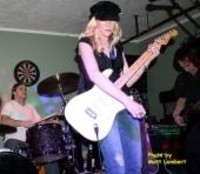 As one that holds classic blues-rock close to heart, it came as a great surprise just how difficult it was to listen through the entirety of MaryBeth Maes’ debut original album, Just Like Me. It’s perplexing as Maes succeeds in every fundamental aspect— a voice with great range and pitch, solid acoustic accompaniment, and great production quality. Unfortunately, there is something just irksome that persists throughout the album. This general dislike could stem initially from the cartoons and bubble writing on the album cover. For an artist with over twenty years of experience in this industry, the discrepancy between the seriousness with which Maes perceives her career and the completely unprofessional design of her album is disconcerting.
As one that holds classic blues-rock close to heart, it came as a great surprise just how difficult it was to listen through the entirety of MaryBeth Maes’ debut original album, Just Like Me. It’s perplexing as Maes succeeds in every fundamental aspect— a voice with great range and pitch, solid acoustic accompaniment, and great production quality. Unfortunately, there is something just irksome that persists throughout the album. This general dislike could stem initially from the cartoons and bubble writing on the album cover. For an artist with over twenty years of experience in this industry, the discrepancy between the seriousness with which Maes perceives her career and the completely unprofessional design of her album is disconcerting.
While it should be refreshing to hear an artist return to the classic roots of sincere lyricism and clean instrumentation, void of modern day’s tendency to synthesize every element of a song — Marybeth Maes’ Just Like Me feels unoriginal. At times, Maes’ voice is too crisp, making her sound feel dated and forced. The influences from other artists are too noticeable in each song — vacillating from Indigo Girls-like-harmonies to brassy Joplin-like vocals. Every artist has an inspiration, but when a listener notices the influence rather than a cohesive sound nostalgic of great musical figures — there is an issue.
Yet another complaint is the contrived nature of Maes’ lyrical rhyming. It is always recommended to write what you know but rhyme is one part of lyrical writing that must be approached with a critical eye and ear. For instance, the track, Garden, begins with: “Diggin deep this time/fills me like red wine/but it don’t give me a headache…barefeet in wet grass, an ocean breeze will pass…” and ends in a cringe. A lyricist is a poet and every poet knows the power of free verse and just the banal fact that every verse need not rhyme — particularly, when it diminishes the very meaning and purpose of writing.
Marybeth Maes’ genuine passion for the art of making music is undeniably present — that remains unquestioned. Maes is committed to fighting the good fight in this treacherous battlefield and after so many years, the fact that Maes still has the impetus to continue with her passion merits respect. I commend Maes for taking the jump from cover artist to original music, but unfortunately this album lacks a cohesiveness and depth to stand apart from other acts in the past and present.
By Marion Bradford
[Rating: 4/5]
